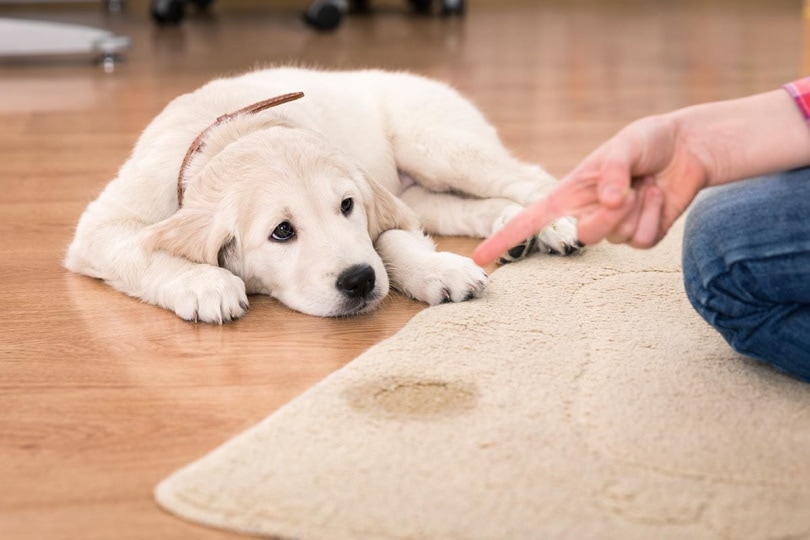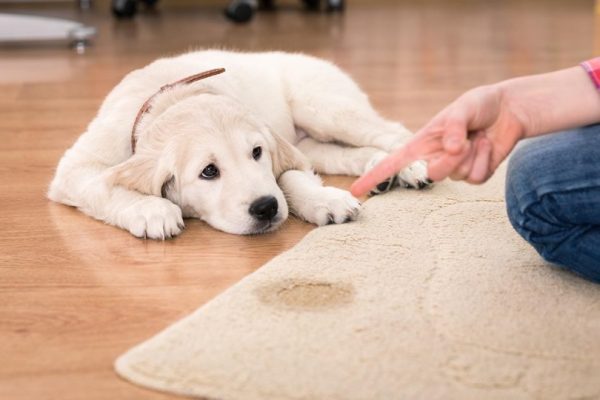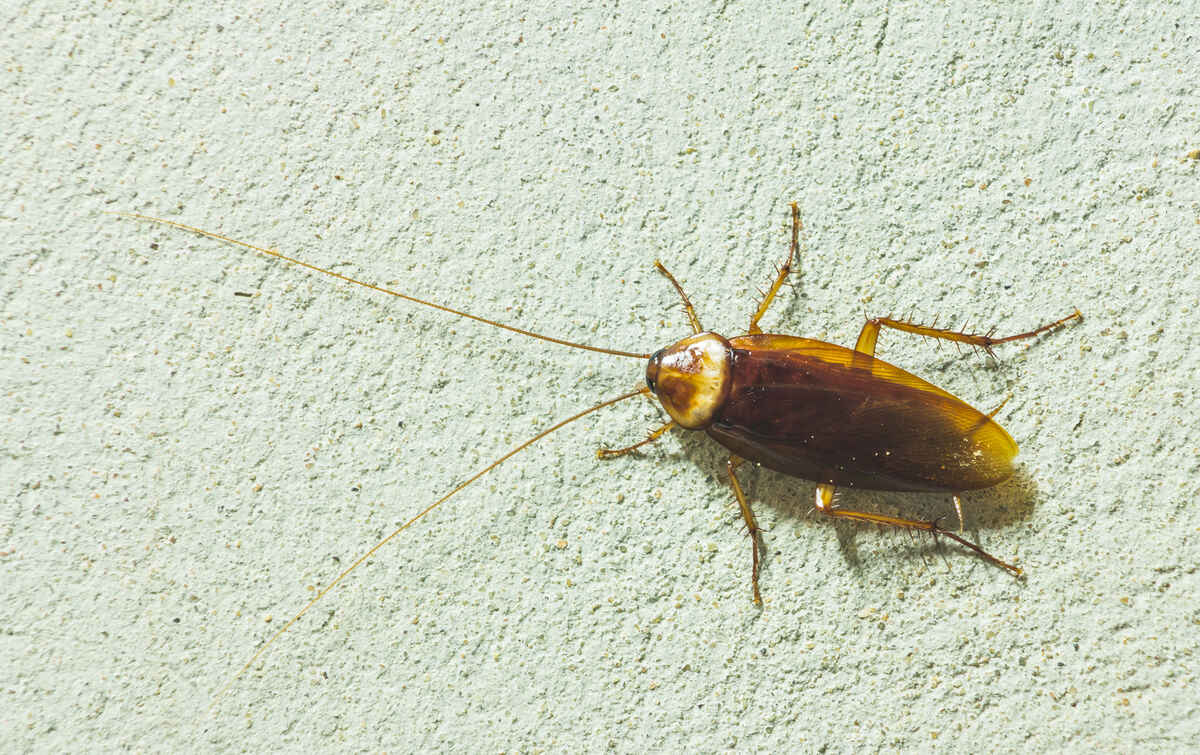Click to Skip Ahead
Puppies are the best; they’re cuddly, energetic, and a blast to play with! That doesn’t mean there aren’t some not-so-fun aspects of puppyhood, though. Take house training, for example.
House training your pup can be challenging, especially when it seems like your new puppy has to pee all the time. Knowing just how often puppies need to go would be a great help in figuring out their potty schedule!
So, how often do puppies need to pee? It depends on each individual dog and the dog’s age. However, there are some general rules of thumb you can go by.
How Often Should a Puppy Pee?
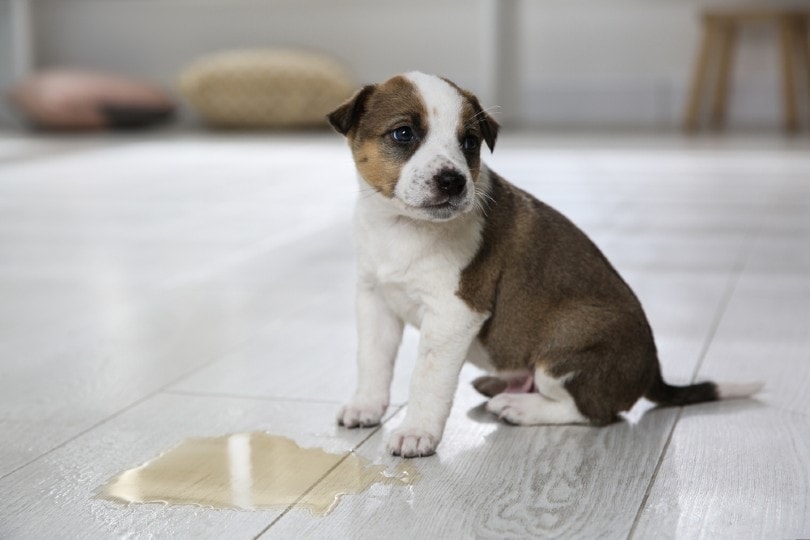
Puppies have small bladders, which is why they need to pee so often. A good rule to follow is that pups have control of their bladders for as long as they are old, at least up to about 9 months of age. That means 1-month-old puppies should go to the bathroom every hour, while 6-month-old puppies should be able to control their bladders for up to 6 hours. However, every dog is different, so your dog may not follow this strictly.
You should also know that when very young puppies drink water, their bladders fill up fast, so they’ll usually need to go pee between 10 and 30 minutes later.
So, if you have a puppy around 9 weeks of age, taking them out every one to two hours is the place to begin, as is taking them out quickly after meals. Then, as they get older, you can begin to lengthen the time between potty breaks. Between 4 and 6 months of age, puppies should have almost complete control of their bladders.
How Often Do Puppies Need to Pee at Night?
The good news is that puppies are a little better at controlling their bladders during sleep! You can help them out, though, by removing their bowl of water a couple of hours before bed so they don’t drink too much before sleeping. It’s also advisable that you crate your dog overnight, as dogs are less likely to pee in their own space due to their dislike of uncleanliness. Just make sure you don’t get an overly large crate, as they could simply pee in the corner, then sleep away from it. You might also want to put a puppy pad down in case of accidents.
That said, with younger pups, in particular, you’re likely going to need to take at least one mid-night bathroom break (following the rule from above, if your puppy is 4 months of age or under and you sleep for 8 hours, you’ll need one break). If your pup is sleeping in their crate in your room, you’ll likely be woken up by them whining or scratching as they signal they need to go out. However, if you’re a heavy sleeper who isn’t likely to hear them, you’d be better off setting an alarm to wake yourself up for your pet’s potty break.
When you do get up to take your dog out to pee, you’ll need to be careful not to rile them up into thinking it’s playtime. Don’t give your pup a lot of attention; simply take them out, then put them right back in the crate. If you give your puppy lots of praise and pets during these mid-night runs, you may find them waking you up just for attention rather than for a need to urinate.
What Does It Mean if My Puppy Is Peeing More Than Normal?
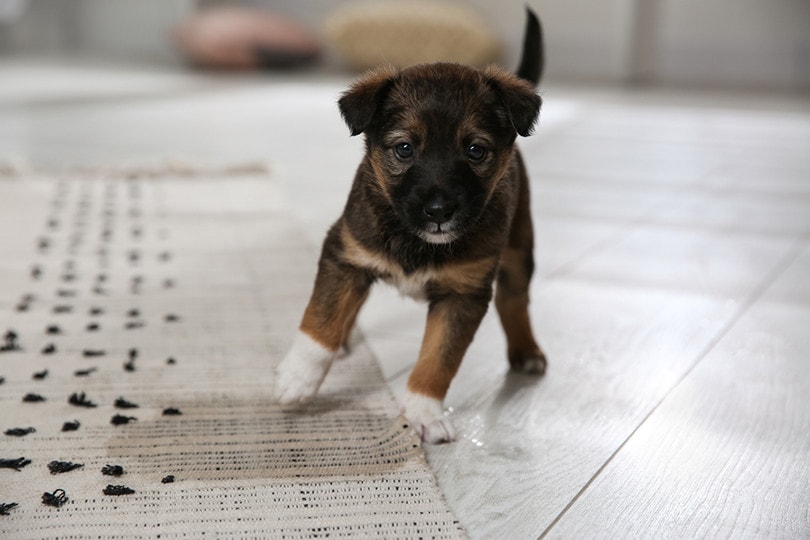
What do you do if you find your puppy is peeing more often than it should? If it’s just a little bit, you shouldn’t worry, but what if they’re going a lot? Either urinating very frequently even as they get older or leaking urine in between toilet breaks. What does it mean when your puppy is peeing more than average? The culprit is often either a medical or behavioral issue.
Medical Issues That Can Cause Your Puppy to Pee Frequently
There are several medical issues that could result in your puppy needing to pee more than is typical. Some of these health issues are:
Rarely your puppy might have something medically wrong with them that’s causing them to pee too much, take them to the vet for a check up if you have any concerns. Your vet can run tests to see if they’re experiencing any of the above or suffering from another medical problem that causes frequent urination. If it is a health issue, your vet can recommend the best course of action. Medical issues in young dogs will also usually present with other signs of problems such as failure to grow or thrive as well as litter mates.
Behavioral Issues That Can Cause Your Puppy to Pee Frequently
Sometimes the cause of frequent urination can be behavioral rather than medical. For example, dogs who experience anxiety or shyness may pee when they get nervous. This is known as submissive urination and can be quite common in young dogs. If you think anxiety could be the reason, you should try carefully upping your pup’s socialization and exercise to help them become less anxious and more confident. If that doesn’t work, you may want to look into a reputable trainer who can help resolve the issue.
Another reason your puppy may be peeing more often than usual is that they’ve started urine marking. This typically begins around 3 months of age or so and is the act of them marking their territory. Usually, you should find that this happens outside more than inside (thankfully!). Curbing this behavior may take some time, but it shouldn’t be difficult. It can involve a combination of close supervision, blocking access to the areas where they like to mark, neutering, and more.
Some puppies like to play with their water and end up drinking a lot of it. It can be for the fun of it, or as a displacement activity if they are anxious or over excited.
Summing Up
Puppies have much tinier bladders than adult dogs, which means they need to pee way more often. It is best to schedule your pup’s potty breaks with the “age to hours they can hold their bladder” rule. That means, depending upon their age, you could be taking your dog out anywhere from every hour to every 6 hours. Luckily, the time between pee breaks will lengthen as they get older.
You’ll also need to be ready for a middle of the night bathroom run for younger pups. While they can control their bladders a little better during sleep, 8 hours is still a long time for them.
And, if you notice your puppy is peeing much more frequently than seems normal, take them to see the vet to find out if it’s a medical issue. If it isn’t, consider whether your dog is dealing with a behavioral issue such as submissive urination or urine marking. With either medical or behavioral, you should be able to clear up the problem in time.
Taking the time to take your dog out as needed will help you to be successful in potty training them, so make sure to put in the work that will keep both you and your pup happy!
Related reads:
- Do Puppies Pee in Their Sleep? Is It Normal?
- How Long Can You Leave A Puppy Alone?
- Why Does My Puppy Pee in the Crate, & How Can I Stop It?
Featured Image Credit: Olimpik, Shutterstock

